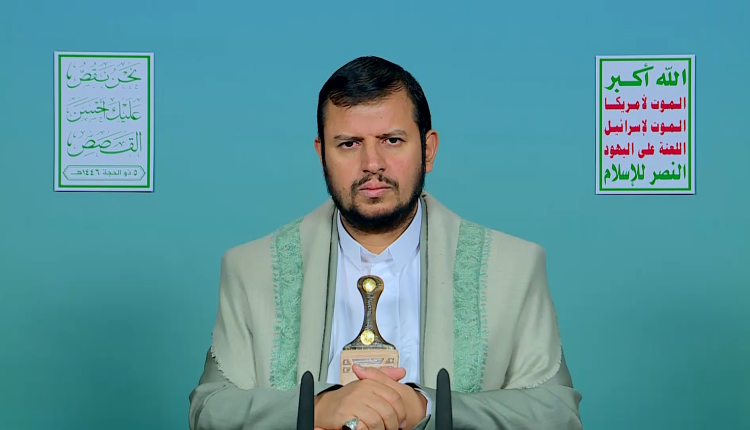Migration to God… The Path of Dignity and Righteousness: A Reading of the Fourth Lesson from the “Quranic Stories” Series by Sayyid Leader Abdulmalik Badr al-Din al-Houthi
In his fourth lesson of the “Quranic Stories” series, Sayyid Leader Abdulmalik Badr al-Din al-Houthi examined a pivotal station in the life of Prophet Abraham (peace be upon him)—the moment of migration. This migration was not merely a geographic relocation; rather, it represented a profound turning point in the course of the divine message, opening vast spiritual horizons for spreading God’s religion and establishing His proof before the nations.
The Sayyid began his lesson by pausing over Abraham’s own words:
“And he said, ‘Indeed, I am going to my Lord; He will guide me.’”
He explained that Abraham’s migration occurred by God’s leave, after Abraham had completed his mission of establishing the proof against his people. Had Abraham remained in Iraq, the message would have been effectively frozen, whereas this migration served as the key to a new phase of invitation and proclamation.
The Sayyid pointed out that God, exalted be He, prepared fresh prospects for His prophet Abraham through this migration—settling some of his family in Mecca and others in the Levant—and that the consequences of that decision continue to reverberate until the Day of Resurrection. He emphasized that these transformations were not arbitrary but rather part of a wise, divine plan.
Highlighting Abraham’s declaration:
“Indeed, I will migrate to my Lord; indeed, He is the Exalted in Might, the Wise,”
the Sayyid underscored how this verse reflects Abraham’s absolute trust in God’s guardianship. He noted that the migration expressed deep faith in God’s might and wisdom, and Abraham’s certainty that God does not abandon His believing servant—especially at a moment of complete separation from his people and family.
The Sayyid then expanded on the spiritual dimension of migration, stressing that dignity (ʿizzah) is an essential component of one’s faith identity. A believer should not remain in an environment where he is humiliated or prevented from fulfilling his religious duties; rather, he must migrate as soon as the opportunity arises. In such circumstances, migration becomes a faith-driven obligation rather than a mere option.
He explained that migrating for the sake of God serves as the gateway to building a faith-based community—one that cooperates in righteousness and piety and collectively undertakes the responsibilities of enjoining good and forbidding evil. He clarified that faith cannot flourish in individual isolation, which leads to weakness, but only through gathering within a unified, believing body.
In this context, he drew attention to Prophet Lot (peace be upon him), who was not merely a believer in Abraham but also a supporter, helper, and migrant alongside him—a reality captured in the verse:
“So Lot believed in him.”
This phrase underscores the practical solidarity that accompanies theoretical belief.
The Sayyid affirmed that God’s choice of the Levant (Bilad al-Sham) as Abraham’s migration destination was part of Divine planning. The Levant was a blessed land—“We blessed it for the worlds”—and, at that time, free from the domination of tyrants such as Nimrod. This favorable environment allowed Abraham to pursue his mission of invitation and proclamation without harassment or persecution.
Toward the end of the lesson, the Sayyid turned to the human aspects of Abraham’s supplication, in which he said:
“My Lord, grant me [a child] from among the righteous.”
He explained that righteousness encompasses all the noble qualities one seeks in offspring—from sound judgment and moral virtue to mental acuity—and that God had given Abraham glad tidings of a gentle son, as indicated by the verse:
“Indeed, Abraham was forbearing, grieving, and [frequently] returning [to Allah].”
He clarified that forbearance (ḥilm) implies behavioral and mental balance in various circumstances, particularly in moments of anger or provocation.
Thus, in this lesson, Sayyid Leader Abdulmalik Badr al-Din al-Houthi offered a profound reading of the meaning of migration—as a prophetic choice, a faith-based commitment, a collective transformation, and a blessed turning point on the path of establishing God’s religion. Drawing inspiration from the life of the “Friend of the Merciful,” he conveyed timeless lessons in trust in God, standing for truth, and building a righteous community.

